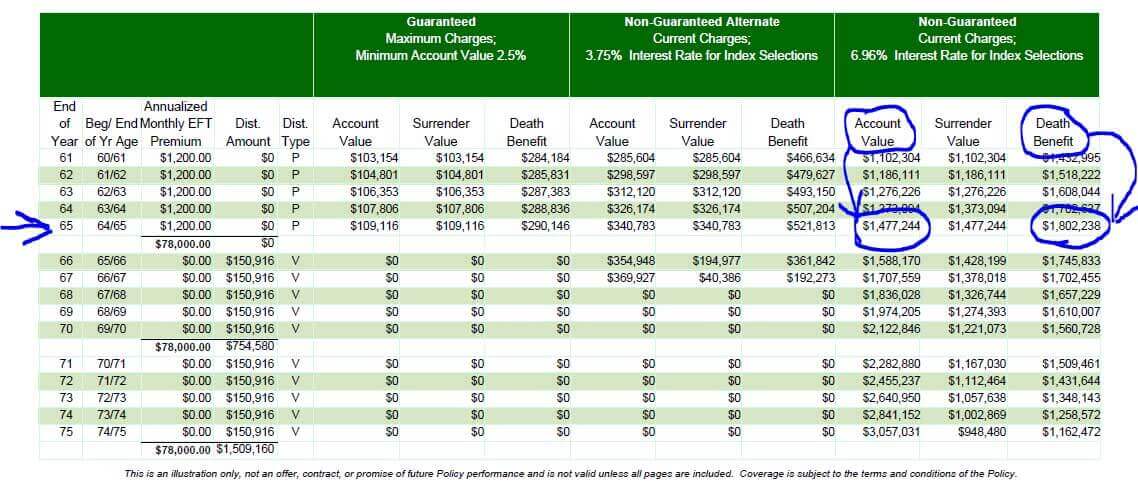All Categories
Featured
Table of Contents
1), typically in an attempt to defeat their group standards. This is a straw guy disagreement, and one IUL individuals love to make. Do they compare the IUL to something like the Vanguard Total Stock Exchange Fund Admiral Show no tons, a cost proportion (ER) of 5 basis factors, a turn over proportion of 4.3%, and an exceptional tax-efficient document of distributions? No, they contrast it to some terrible proactively managed fund with an 8% load, a 2% ER, an 80% turnover ratio, and a terrible record of temporary resources gain circulations.
Mutual funds commonly make yearly taxed distributions to fund owners, also when the value of their fund has dropped in worth. Mutual funds not just require earnings coverage (and the resulting annual tax) when the mutual fund is rising in worth, but can additionally enforce earnings taxes in a year when the fund has decreased in value.
You can tax-manage the fund, collecting losses and gains in order to reduce taxed distributions to the capitalists, yet that isn't somehow going to transform the reported return of the fund. The possession of shared funds may require the common fund proprietor to pay approximated taxes (what is guaranteed universal life insurance).

IULs are simple to place to make sure that, at the owner's death, the recipient is exempt to either income or inheritance tax. The same tax obligation reduction methods do not work nearly too with common funds. There are numerous, commonly pricey, tax catches connected with the moment acquiring and selling of shared fund shares, traps that do not put on indexed life insurance policy.
Chances aren't really high that you're mosting likely to be subject to the AMT because of your shared fund circulations if you aren't without them. The remainder of this one is half-truths at best. While it is real that there is no income tax obligation due to your successors when they acquire the proceeds of your IUL plan, it is likewise true that there is no income tax obligation due to your successors when they inherit a common fund in a taxable account from you.
Index Universal Life Insurance Vs Whole Life
There are far better methods to avoid estate tax obligation concerns than getting financial investments with low returns. Common funds may trigger revenue taxation of Social Security advantages.

The development within the IUL is tax-deferred and might be taken as tax free income via financings. The policy owner (vs. the mutual fund supervisor) is in control of his or her reportable earnings, thus enabling them to reduce or perhaps get rid of the tax of their Social Protection benefits. This one is excellent.
Below's another very little issue. It's real if you get a mutual fund for say $10 per share prior to the distribution date, and it distributes a $0.50 circulation, you are then going to owe taxes (possibly 7-10 cents per share) in spite of the reality that you have not yet had any kind of gains.
Yet ultimately, it's truly about the after-tax return, not how much you pay in taxes. You are mosting likely to pay more in taxes by using a taxable account than if you get life insurance policy. Yet you're additionally probably going to have more money after paying those taxes. The record-keeping requirements for having mutual funds are dramatically extra intricate.
With an IUL, one's documents are maintained by the insurer, copies of annual declarations are sent by mail to the proprietor, and circulations (if any kind of) are amounted to and reported at year end. This one is also type of silly. Naturally you ought to maintain your tax obligation documents in case of an audit.
Iul Annuity
All you need to do is push the paper right into your tax folder when it shows up in the mail. Hardly a factor to get life insurance policy. It resembles this person has actually never purchased a taxable account or something. Mutual funds are typically component of a decedent's probated estate.
In enhancement, they go through the delays and expenditures of probate. The proceeds of the IUL plan, on the various other hand, is constantly a non-probate circulation that passes outside of probate straight to one's named recipients, and is as a result exempt to one's posthumous financial institutions, unwanted public disclosure, or similar delays and prices.
Medicaid incompetency and life time revenue. An IUL can offer their owners with a stream of earnings for their whole life time, regardless of how lengthy they live.

This is helpful when arranging one's events, and transforming possessions to revenue prior to an assisted living home confinement. Shared funds can not be transformed in a similar manner, and are almost constantly considered countable Medicaid properties. This is an additional dumb one promoting that inadequate individuals (you recognize, the ones that require Medicaid, a government program for the inadequate, to spend for their retirement home) should use IUL rather of mutual funds.
Indexed Universal Life Leads
And life insurance policy looks terrible when compared fairly against a pension. Second, individuals that have money to get IUL over and past their pension are going to need to be terrible at managing money in order to ever receive Medicaid to pay for their retirement home prices.
Persistent and incurable disease biker. All plans will permit an owner's simple access to money from their policy, commonly waiving any abandonment penalties when such individuals endure a severe disease, need at-home treatment, or become confined to an assisted living facility. Common funds do not offer a similar waiver when contingent deferred sales fees still relate to a shared fund account whose proprietor needs to sell some shares to money the expenses of such a remain.
Life Insurance Stock Market
Yet you get to pay more for that advantage (biker) with an insurance plan. What a good deal! Indexed global life insurance policy supplies survivor benefit to the beneficiaries of the IUL owners, and neither the proprietor neither the beneficiary can ever shed cash because of a down market. Mutual funds offer no such assurances or fatality advantages of any type of kind.
Now, ask yourself, do you actually need or desire a survivor benefit? I absolutely do not need one after I get to monetary self-reliance. Do I desire one? I suppose if it were cheap enough. Of program, it isn't economical. Usually, a purchaser of life insurance policy pays for the real expense of the life insurance coverage benefit, plus the prices of the policy, plus the revenues of the insurance provider.
Equity Indexed Universal Life Insurance Policy
I'm not entirely sure why Mr. Morais included the entire "you can not lose money" again below as it was covered rather well in # 1. He just intended to repeat the ideal selling point for these points I expect. Once more, you do not shed small dollars, yet you can shed real bucks, as well as face severe possibility expense as a result of low returns.

An indexed universal life insurance policy policy proprietor may exchange their policy for a completely different policy without setting off earnings tax obligations. A common fund owner can stagnate funds from one shared fund company to an additional without selling his shares at the former (hence causing a taxable occasion), and buying brand-new shares at the latter, usually subject to sales charges at both.
While it is real that you can exchange one insurance coverage for an additional, the factor that people do this is that the initial one is such a horrible policy that also after getting a new one and undergoing the very early, negative return years, you'll still come out ahead. If they were marketed the ideal plan the initial time, they shouldn't have any kind of need to ever before trade it and go with the very early, unfavorable return years once again.
Latest Posts
Guaranteed Ul Insurance
Indexed Universal Life Insurance Reviews
Universal Life Insurance Good Or Bad